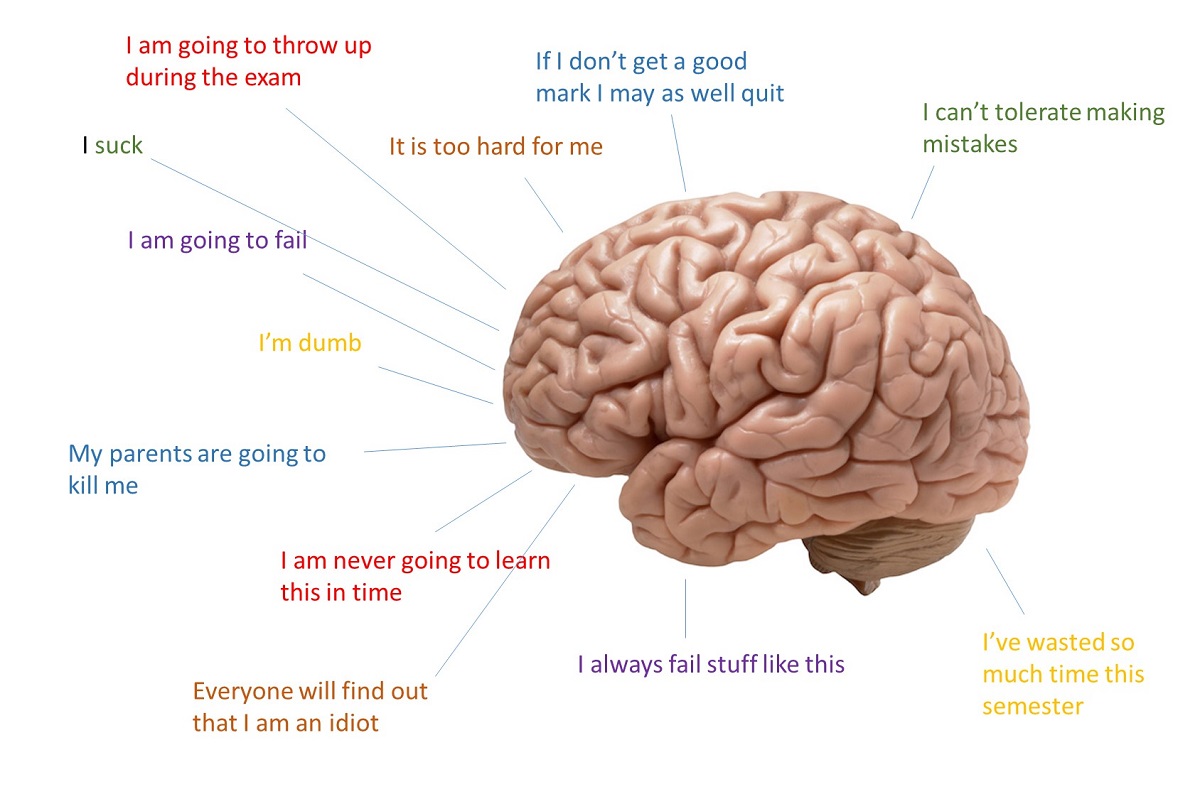
The Preparing for Exams series was first posted in 2017. Each year now we update the posts and repost them as exams approach. Let’s face it, the rules for preparing for exams don’t really change that much over time.
As you prepare for exams, your brain can be both your best friend and your worst enemy.
On the good side, if all goes well, it will be your brain that holds all that wonderful information that you will unleash during the exam to rapturous applause from other students.
On the downside, it might be your brain that gets distracted when studying, freaks out, tells you you aren’t good enough and goes blank during the exam. Brains can be very good at derailing us during study time, despite our best intentions.
The good thing about brains is that despite all their mushy grey complexness (that is not a word), you can deal with them in relatively simple ways.

Catch your brain out and give your thinking a name
So when brains try to derail our study efforts, they usually try to do it in sneaky ways. You might suddenly find yourself in front of the TV when you are supposed to be studying, freaking out in front of a pile of text books, or standing at the fridge wondering what you’ll have for your 7th snack of the hour.
Whilst it is not always clear how you went from calm diligent student to hot mess in such a short period of time, you’ll find it is pretty logical if you can access how you are thinking – that is the thoughts, images and explanations going on in your head.
And even though brains do some amazing stuff, they are also prone to being completely irrational at times and saying some pretty stupid s&%t. I’ve spoken about this previously in relation to procrastination.
It is hard to stop your brain from thinking irrational thoughts, but you can get much better at catching it out when it does. Here are 16 of the most common brain-farts.
Irrational thinking patterns
Fortune-telling – predicting that everything will turn out crappily even though we can’t really tell the future (e.g. “I know I’ll mess up”)
Filtering – only attending to the negative details in a situation.
Polarized thinking – thinking things are either one extreme or another (often called ‘black-or-white’ thinking) (e.g. “If I don’t get a good mark, I’ll totally fail”).
Overgeneralisation – coming to a general (and typically negative) conclusion based on a single incident or piece of evidence (e.g. “I always fail exams”)
Jumping to conclusions – assuming we know how another is thinking or feeling, without checking whether we are correct (e.g. “The tutor thinks I am an idiot).
Catastrophising – expecting disaster to strike, no matter what (e.g. “I’ll freak out and everyone will sit, watch and laugh”).
Personalization – believing that everything others do or say is a direct personal reaction towards us.
Control fallacies – seeing ourselves as either complete victims, or totally responsible for what happens to us.
Fallacy of fairness – thinking that the world is always fair.
Blaming – holding others, or ourselves as totally responsible for our problems (e.g. “If I fail this topic, it is all my fault”).
Shoulds – having rigid rules about how things or people should/ought/must be (e.g. “I should never fail a topic”).
Emotional reasoning – assuming that how we feel is the truth (e.g. I feel like a failure, therefore I am a failure)
Fallacy of change – believing that we need to (and can) change other people in order to be happy.
Global labelling – instead of describing an error in a specific context, we resort to labelling ourselves a complete failure (e.g. “I’m an idiot”).
Always being right – continually trying to prove that our opinions and actions are correct, and that being wrong is unthinkable.
Heaven’s reward fallacy – believing that our sacrifice and self-denial will always pay-off, as though someone is keeping score.
I’d be very surprised if you’ve not caught your brain engaging in one of these irrational thinking patterns before. I’ve probably engaged in all of them just today!
But what do you do when you catch your brain doing this?

Be all accepting and benevolent towards your brain
So one school of thought says that brains do this kind of stuff all the time (i.e. produce negative automatic thoughts), and it is pretty hard to stop them, so instead of trying to change or get rid of these thoughts, we should attempt to calmly acknowledge their presence, thank them for coming, and redirect ourselves back to the task at hand.
So for example, if I catch myself feeling very anxious and thinking “I am going to fail this exam”, I need to acknowledge the presence of this thought (“I am having the thought that I will fail my exam”), thank it for coming along (“hey there thought, nice of you to stop by”), note that it is not particularly helpful at this time (“sorry, but you aren’t hugely helpful whilst I am trying to study”) and refocus myself on the task at hand (“hey thought, I need to get back to my study”).
This sounds simple, but its kinda hard, and requires regular practice. Most negative thoughts don’t just disappear during this process. With practice however, you can learn to create some distance between you and your automatic negative thoughts.

Some mild challenging
Another school of thought says we should armour up and have a little bit of a fight with these thoughts. If they are irrational, perhaps we should challenge them a bit and try to come up with a more rational thought.
For example, say I have the thought “I am going to fail the exam tomorrow“.
With just a few questions, I can start to attack the logic of that thought:
Thought challenging questions
Am I falling into a thinking trap (e.g. catastrophising, fortune telling)? – YES, FORTUNE TELLING
Am I basing my judgement on the way I ‘feel’ instead of the facts? – I MIGHT FEEL LIKE I AM GOING TO FAIL, BUT I AM ACTUALLY QUITE WELL PREPARED
What is the evidence that this thought is true? What is the evidence that this thought is not true? I DON’T REALLY HAVE MUCH EVIDENCE THAT THIS WILL HAPPEN AND I HAVE PASSED MOST EXAMS SO FAR
What would I tell a friend if he or she had that thought? – I’D TELL THEM TO STUDY HARD AND PREPARE AND NOT WORRY ABOUT GRADE
Am I confusing a “possibility” with a “probability”? It may be possible, but it is likely? – THERE IS A SLIGHT CHANCE BUT I’M PROBABLY OVERESTIMATING THE CHANCES OF FAILING
Am I 100% sure that ________________ will happen? – NO
How many times has _________________ happened before? – I HAVE FAILED A COUPLE BUT PASSED A LOT MORE EXAMS
Is ____________ really so important that my future depends on it? IN THE GRAND SCHEME IT IS JUST AN EXAM
What is the worst that could happen? – I FAIL THE EXAM
Is this a hassle or a horror? – I’LL BE PRETTY UPSET BUT I WILL RECOVER AND FIND A WAY TO DEAL WITH IT
If it did happen, what can I do to cope or handle it? – TALK TO MY LECTURER ABOUT WHAT TO DO
Often this process ends up in us having a more rational version of the thought such as “I am worried I will fail the exam tomorrow but I am doing my best to prepare and will find a way to cope if it happens“. We might still feel a bit anxious but it is less debilitating and we are less likely to quit trying altogether.

Calming techniques
Finally, if all this focus on thoughts is just freaking you out, try focusing instead on calming your body, and your mind will follow. On Monday, I wrote about 5 techniques you can use to manage physical tension/stress.
Final words
My brain thinks all sorts of irrational stuff all the time and I bet yours does to. I wouldn’t trade my brain in though because otherwise I’d end up like this:

During times of stress like exam time, irrational thoughts are common. Hopefully, as a result of this post you are a little better at understanding the different ways your brain can be silly and some simple strategies to address it.
In Part 5 of the Preparing for Exams series, I explore the topic of embracing failure, by modelling it. Yes, I totally fail.
Want to comment on this article, or ask me a question about the health and well-being services available to you as a student? Feel free to comment below, abuse me on Twitter or email me (gareth.furber@flinders.edu.au)

